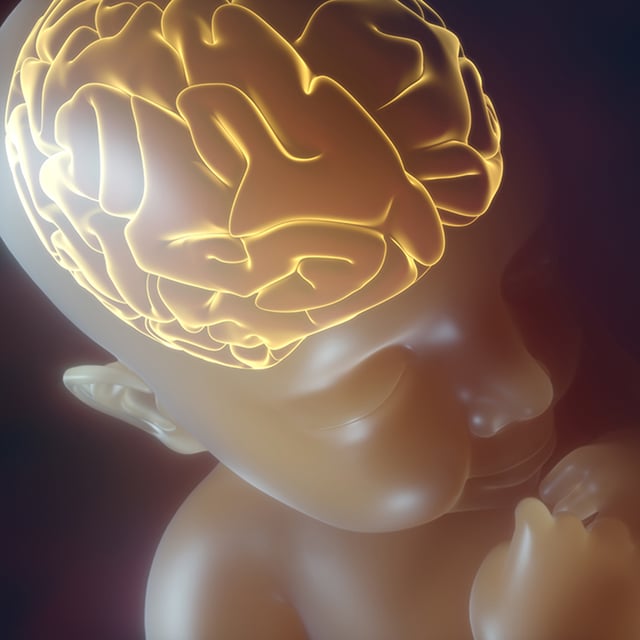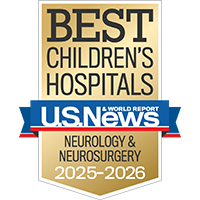Tender wagging care
Our therapy dogs spread joy and smiles at the bedside and throughout the hospital.
Visit Child Life services

A seizure is caused by sudden, abnormal and excessive electrical activity in the brain. By definition, neonatal seizures occur during the neonatal, or newborn, period. For a full-term infant, this is the first 28 days after their birth. Most of these seizures occur within the first week of a baby's life. Premature or low birth weight babies are more likely to suffer neonatal seizures than full-term infants.
Many of the visible signs of neonatal seizures – such as chewing motions and "bicycling" movements – also occur in healthy newborns. Therefore, testing is usually required to confirm the diagnosis.
The outcomes for babies who have neonatal seizures depend on the type of seizure and the underlying cause. Some neonatal seizures are mild and short-lived and do not cause any lasting health problems. However, prolonged and untreated seizures can cause permanent damage. This is due to decreased oxygen flow to the brain and excessive brain cell activity. Neonatal seizures are often symptoms of a more serious underlying condition, particularly a brain injury. For this reason, babies experiencing neonatal seizures should receive specialized care immediately.
About half of all babies who have neonatal seizures will develop epilepsy later in life. Those with seizures related to brain injuries or developmental abnormalities may have other complications stemming from the underlying brain damage such as cerebral palsy, intellectual disability and other neurological disorders.
Prompt diagnosis and treatment of neonatal seizures is essential. Your newborn's health care team will also work to identify and treat any underlying cause of the seizures.
To control the seizures, anticonvulsant medications may be prescribed, including:
Your baby will be closely monitored at all times while receiving these medications.
Babies born with hypoxic ischemic encephalopathy (HIE), a type of brain injury caused by inadequate oxygen or blood flow to the brain, may have abnormal movements or seizures. They may receive hypothermia treatment, which involves cooling the baby's brain and body by a few degrees immediately after birth for three days. Research shows the treatment may reduce brain injury. Babies are closely monitored during treatment, and then slowly re-warmed to normal body temperature.
Neonatal seizures have a variety of causes. These include:
In rare cases, a baby's neonatal seizures may be caused by a condition called benign familial neonatal seizures, also known as fifth-day convulsions or fifth-day fits. This condition is inherited, and the baby's mother or father will also have had the disorder. Many babies with benign familial neonatal seizures develop normally, although some may have developmental delays that are seen in early childhood.
Neonatal seizures can be difficult to diagnose because the seizure may be short and subtle. In addition, the signs of seizures may mimic normal movements and behaviors seen in healthy newborns.
Symptoms depend on the type of seizure the baby is experiencing: subtle, clonic, tonic or myoclonic.
Subtle seizures are more common among full-term babies. Symptoms include:
Clonic seizures are very brief and don't happen often in babies. They may go away on their own, but if they don't, they require long-term treatment. Symptoms include rhythmic jerking movements that may involve the muscles of the face, tongue, arms, legs or other regions of the body.
Tonic seizures usually occur while the baby is sleeping and typically last about 20 seconds or less. Symptoms of tonic seizures include:
Myoclonic seizures are more frequent in pre-term babies than full-term ones. If massive, they can indicate severe brain injury. However, the signs are similar to normal movements in a healthy baby, so it can be difficult to tell that a seizure has occurred. Symptoms include quick, single repetitive jerking motions, involving one arm or leg or the whole body.
A test called an electroencephalogram (EEG) is essential for diagnosing and managing neonatal seizures. This is a non-invasive test where electrodes are applied to the baby's head to record electrical activity in their brain. Abnormal results can indicate a risk for seizures. However, babies with benign familial neonatal seizures usually have normal EEG readings.
If the EEG indicates your baby is having seizures, imaging tests of the brain, including magnetic resonance imaging (MRI) and computed tomography (CT) scan, may be used to determine the cause.
UCSF Benioff Children's Hospitals medical specialists have reviewed this information. It is for educational purposes only and is not intended to replace the advice of your child's doctor or other health care provider. We encourage you to discuss any questions or concerns you may have with your child's provider.

UCSF Newborn Brain Research Institute
The Newborn Brain Research Institute promotes brain development and recovery by leveraging clinical excellence, a cutting-edge data hub and innovative basic and clinical research.

One of the nation's best for neurology & neurosurgery

Ranked among the nation's best in 11 specialties
Tender wagging care
